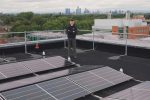Home Efficiency: Save Money and The Planet

Efficiency is the key to a comfortable and sustainable home. By making simple changes and improvements to your home, you can increase its efficiency, reduce energy waste, and save money on utility bills. In this article, we will explore why energy efficiency is so important and then we’ll help you to identify ways to improve home efficiency and create a more environmentally friendly living space.
Why Home Efficiency is So Important
Energy efficiency is vital for several reasons, and its importance cannot be overstated. However, don’t be misled into thinking that efficiency lacks style from the anthracite grey radiators through to stunning mirrored designs; you can still have a stunning home along with lower bills.
Here are some key reasons why energy efficiency is so important:
Environmental Sustainability
Energy efficiency plays a crucial role in protecting the environment. Most of our energy comes from burning fossil fuels like coal, oil, and natural gas, which release greenhouse gases into the atmosphere, contributing to climate change. By reducing our energy consumption through efficiency measures, we can decrease greenhouse gas emissions, minimize our carbon footprint, and help mitigate the impacts of climate change. Energy efficiency also reduces other forms of environmental pollution associated with energy production, such as air and water pollution, preserving our natural resources and ecosystems.
Economic Saving
Energy efficiency can save homeowners and businesses money by reducing energy consumption and lowering utility bills. Investing in energy-efficient appliances, insulation, lighting, and other measures can result in long-term cost savings on energy bills. Additionally, energy-efficient homes and buildings tend to have higher property values and can attract potential buyers or tenants. Energy efficiency also stimulates economic growth by creating jobs in industries such as construction, manufacturing, and renewable energy, contributing to local economies.
Energy Security
Energy efficiency enhances energy security by reducing dependence on fossil fuels and diversifying energy sources. Fossil fuels are finite resources, and their availability and prices can be volatile, leading to energy supply disruptions and price fluctuations. By improving energy efficiency, we can decrease our reliance on fossil fuels and promote the use of renewable energy sources, such as solar, wind, and geothermal, which are more abundant, sustainable, and reliable in the long term.
Health and Comfort
Energy-efficient homes and buildings provide better indoor air quality, comfort, and health for occupants. Proper insulation, sealing air leaks, and using energy-efficient HVAC systems can help maintain a consistent indoor temperature, reduce drafts, and prevent the infiltration of pollutants, allergens, and dust. This can result in a healthier and more comfortable living or working environment, reducing respiratory issues, allergies, and other health problems associated with poor indoor air quality.
Global Energy Demand
As the global population continues to grow, so does the demand for energy. By improving energy efficiency, we can reduce the strain on energy resources and infrastructure, making energy more accessible and affordable for everyone. Energy efficiency measures can be implemented at various scales, from individual homes to large commercial and industrial buildings, making it a scalable solution to address the increasing global energy demand.
Climate Change Mitigation
Energy efficiency is a critical strategy for mitigating climate change, as it helps reduce greenhouse gas emissions. Greenhouse gases trap heat in the atmosphere, contributing to the warming of the planet. By reducing energy consumption and emissions through energy efficiency measures, we can slow down the pace of climate change, protecting our planet for current and future generations.
Ten Ways To Improve Your Home Efficiency
Efficiency is the key to a comfortable and sustainable home. By making simple changes and improvements to your home, you can increase its efficiency, reduce energy waste, and save money on utility bills.
1. Upgrade to Energy-Efficient Appliances
Appliances such as refrigerators, dishwashers, washing machines, and HVAC systems are some of the biggest energy consumers in a home. Upgrading to energy-efficient appliances with high Energy Star ratings can significantly reduce your home’s energy consumption. Look for appliances with features like automatic shut-off, programmable settings, and smart technology that can help you optimize their performance and minimize energy waste.
2. Manage Your Thermostat
Your thermostat plays a crucial role in your home’s energy efficiency. Program your thermostat to adjust the temperature based on your schedule to avoid overheating or over-cooling your home when you are not there. Consider installing a smart thermostat that can learn your preferences and adjust the temperature accordingly, saving you energy and money in the long run. If you’ve had your heating system a while, it may pay to upgrade to a more efficiency heating solution and radiators.
3. Seal Air Leaks
Air leaks in your home can cause energy waste and make your HVAC system work harder to maintain a comfortable temperature. Check for gaps and cracks around windows, doors, and other areas where air can escape or enter. Seal these leaks with weatherstripping, caulking, or spray foam insulation to improve your home’s energy efficiency and reduce your heating and cooling costs.
4. Insulate Your Home
Proper insulation is essential for maintaining a comfortable indoor temperature and reducing energy waste. Insulate your walls, attic, and floors to prevent heat loss in winter and heat gain in summer. Choose insulation materials with high R-values for maximum efficiency. Additionally, insulating your water heater and hot water pipes can help you save energy and reduce your utility bills.
5. Install Energy-Efficient Lighting
Lighting is another significant source of energy consumption in homes. Replace traditional incandescent bulbs with energy-efficient LED bulbs that consume less electricity and last longer. Consider installing motion sensors or timers for outdoor lighting to minimize unnecessary energy use.
6. Plant Trees and Install Shading Devices
Trees and shading devices can provide natural shading to your home, reducing heat gain in summer and lowering your cooling costs. Plant trees strategically around your home to block the sun’s rays from entering through windows or install shading devices like pergolas, awnings, or shades to block direct sunlight. This can help you reduce your reliance on air conditioning and lower your energy consumption.
7. Use Water-Efficient Fixtures
Water usage is another important aspect of home efficiency. Install water-efficient fixtures such as low-flow toilets, showerheads, and faucets to reduce your water consumption. Fix any leaks promptly to prevent water waste and save on your water bills.
8. Recycle and Compost
Implement a recycling and composting system in your home to reduce waste and promote sustainability. Separate recyclable materials from regular waste and dispose of them properly. Compost kitchen scraps and yard waste to create nutrient-rich soil for your garden. Recycling and composting not only help the environment but also contribute to improving your home’s overall efficiency.
9. Unplug Electronics When Not in Use
Electronics and appliances continue to consume energy even when they are turned off but still plugged in. Unplug electronics such as televisions, computers, chargers, and other devices when they are not in use to prevent “phantom” or “vampire” energy waste. Alternatively, use power strips with on/off switches to easily turn off multiple devices at once.
10. Educate Your Family on Energy Conservation
Finally, educate your family members about the importance of energy conservation and how they can contribute to improving home efficiency. Encourage simple habits like turning off lights when











